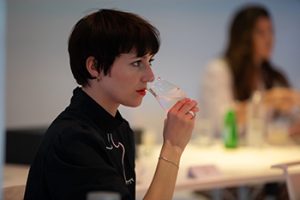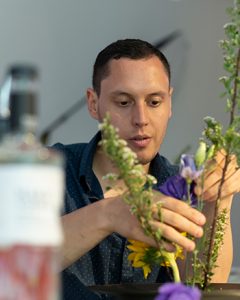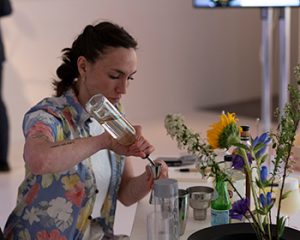The House of Suntory brought back its popular bartender programme for the second year running.
The programme, which sees bartenders learn from the best in the industry, was led by House of Suntory’s Brand Ambassador, James Bowker, and supported by traditional Japanese Craft Masters. After another successful year, we sat down with James Bowker to discuss the highlights and his favourite moments from the sessions:

For anyone that isn’t familiar with The House of Suntory DOJO programme, tell us what it’s all about…
“The House of Suntory Dojo Programme aims to educate bartenders on our premium portfolio of craft spirits: Roku Gin, Haku Vodka, Toki Whisky, and Hibiki Whisky. Dojo, which translates as ‘a place to master the way’, is a first-of-its-kind programme that seeks to engage with bartenders and help them not only improve their skillset, but deepen their understanding of the philosophy and customs that embody The House of Suntory’s roots in Japanese craftsmanship.
“For the second year running and over the course of six months, we hosted a series of masterclasses where bartenders learnt from masters of Sushi, Ikebana (Japanese Flower Arranging), Kaiseki and Tea whilst applying these skills and philosophies to classic cocktails. The programme focuses on education and real growth, rather than the traditional model of competitions.”
What are the key pillars of The House of Suntory DOJO Programme?
“Built on Suntory’s three pillars of Hibiki (Inspiration from Nature), Monozukuri (traditional Japanese principles of craftsmanship), Omotenashi (authentic Japanese hospitality), The House of Suntory Dojo Programme seeks to embrace the idea of Kaizen – ‘constant improvement’ – by connecting bartenders and Japanese Masters from all areas of Japanese culture.”

Can you tell us about your favourite session/what’s the most exciting thing you’ve learnt from a master?
“Each session has brought fascinating insights into Japanese crafts that have helped myself and the Dojo participants to more authentically embrace the culture, but I think for me the session on Ikebana Flower Arranging was the most incredible because we really did a deep dive into the underlying philosophies of beauty and aesthetics which underpin many different elements of Japanese culture.
For example, it taught me the concept of Ma, which places huge value in empty or blank space in art and design, drawing on the Zen concept of emptiness to realise that unfilled space both provides meaning and context to the objects of focus, whilst also allowing infinite potential by welcoming the independent nature of the viewers mind to permeate the piece and become part of their experience of it.”
How do you feel bartenders learnt from concepts such as Monozukuri or Kogei craftsmanship to integrate them into their role as bartenders?
“There are countless ways that we can learn from traditional Japanese crafts, as each embodies not just a particular look or style but seeks to demonstrate unique Japanese philosophies and ideas through their artisanship.
“For example, Monozukuri crafts like gin-making or sushi require you to focus on sourcing perfect raw materials, before refining your tools and techniques in such a way as to allow the natural beauty of the material to shine through your finished craft.
“Looking back, each of our classes have discussed the distinction between balance and harmony, itself an exciting insight that many of us might overlook, as well as concepts like ma (minimalism and negative space) and wabi-sabi (beauty in the natural and aged).”

Did you do anything similar to DOJO as a young bartender, and what inspired you to participate in leading the programme?
“I’ve been incredibly lucky to participate in some outstanding activations with brands throughout my bartending career and whilst none were quite what we are doing with the House of Suntory Dojo, I suppose that is the point! I was, however, inspired by my realisation that the brand events I enjoyed the most, and won my loyalty, were those that focused less on competing or drinking and more on professional development, community authentically engaging with a culture I loved.”
What were the key events and activations you did around The House of Suntory DOJO Programme?
“The four Monozukuri Masterclasses formed the most exciting elements for me. We partnered with Masters of Ikebana flower-art, Sushi-making, Kaiseki cuisine and the Tea Ceremony to provide insights into four topics central to bartending: Aesthetic & Garnishing, Balance & Seasoning, Pairing & Matching, and Hospitality & Theatre.”
How you feel when educating the bartenders?
“To be honest, it’s a simple feeling of humility that I have the opportunity to work with some incredible peers and friends to grow together. So many of us join the hospitality industry for our love of people and I am under no illusion: every skill I have has been gifted to me by better people. The fact that I am now able to give back a little, share some of what I have learned and yet continue growing myself as we are led by the masters is a truly special experience.”
Your favourite memory from DOJO over the past few years?
“Undoubtedly, it was sharing an intimate tea ceremony with a true Master of Tea and our Dojo Senpai. It was incredible to have this opportunity to connect in such a beautiful, traditional way after the year the world has faced.”
Please visit The House of Suntory website to find out more


